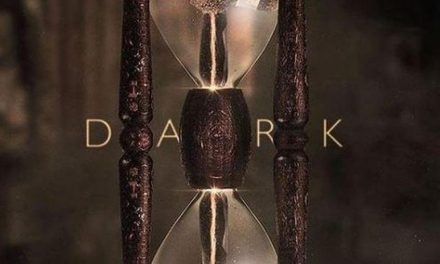One of my favourite words in any language is one I learnt during my seven-plus years living in Wales: hiraeth. A rough translation – Welsh speakers, feel free to post a refined one in the comments! – would be something like ‘a longing for a time and place now gone and which may never have existed in the first place.’ I often run across this feeling in my work on representation, but it seems particularly apt with regard to My Life is Murder (Greenstone TV 2019-present) which is an Australia/New Zealand co-production which began in Australia then moved to New Zealand.
For those unfamiliar with the series, it follows Kiwi (New Zealander) Alexa Crowe (Lucy Lawless), initially in Melbourne, Australia (series 1) and later on Auckland, New Zealand (series 2 through 4). She is a former police detective who retired after the death of her husband, who was also on the police force. She is initially brought out of retirement by her former boss Kieran (Bernard Curry) and eventually becomes a ‘consulting detective’ with first the Melbourne then the Auckland police department. She works with an Australian tech expert/police data analyst, Madison (Ebony Vagulans), across all five series and with an additional, Kiwi, tech, Beth (Tatum Warren-Ngata) in series 3.[i]
The series moved from Australia in series one to New Zealand for subsequent series due to NZ-based Greenstone TV acquiring the rights to the characters after the Australian series was not renewed (Screen Auckland 2021). Diegetically, the move is positioned as being a homecoming of sorts for Alexa. While this can certainly be read in terms of Lawless as a Kiwi actor starring in a series shot in Auckland, it also relates to her wider career. Though known for a number of transnationally successful series, Lawless’ first major role was that of the eponymous Xena in Xena: Warrior Princess (syndicated, 1995-2001, hereafter XWP) which was a spinoff of Hercules: The Legendary Journeys (syndicated, 1995-1999, hereafter HTLJ).[ii] Both series were American productions set in and around an anachronistic ancient Greece but shot in New Zealand; MLIM is the first New Zealand-shot transnational television production to star Lawless since that time. Thus there is an element of homecoming not purely due to Lawless’ national identity but also with regard to XWP.

Lucy Lawless’ Xena: Warrior Princess co-star Renee O’Connor, guest stars in My Life is Murder
This connection is made explicit in episode 2.10, which features a series of intertexts to XWP. Gray (2010), amongst others, notes that cult texts often use intertexts to convey information, though because access to intertexts varies this can create a variety of different readings (Nelson 1997). That said, XWP is widely enough known that it is reasonable to assume that the majority of viewers would be aware of the role, even if they had never seen the series. For those with even the most general knowledge of XWP and its cast, the episode uses clear casting intertexts. Lawless’ co-star in XWP, American actor Renee O’Connor, guest stars in this episode as (spoiler, sorry) that week’s villain, Clarissa Klein. In particular, Clarissa kills her husband Otto, played by Kiwi director (and HTLJ regular) Michael Hurst (who also directed this episode of MLIM, amongst others). While this type of casting intertext is far from uncommon– the CBS series Diagnosis: Murder (1993-2001) utilised such ‘stunt casting’ as a matter of course– it does establish context for a specific scene.
O’Connor’s character Clarissa and her husband run a wellness/self-help business which features residential seminars about their ‘philosophy’. Alexa, going undercover with Madison to investigate Otto’s death, attends one of these seminars which includes a one-on-one meetings with Clarissa. During that meeting, Clarissa offers Alexa a snack: peanuts. Alexa replies ‘I don’t really like peanuts,’ which Clarissa then begins to eat. While this would, on the face of it, seem to be a mundane exchange, it is, in fact, strongly paratextual (or intertextual)[iii] well beyond that of the casting intertext. In an exchange on Twitter,[iv] Lawless and Kevin Sorbo, who played Hercules on HTLJ, had a disagreement over his conservatism and her liberal politics.[v] During this exchange she directly addressed him as ‘Peanut;’ this, then, offers another reading of Alexa’s dislike of peanuts and of the fact that the episode’s villain chooses to consume them. For those unfamiliar with the social media context, the conversation and consumption of peanuts does not render the narrative of the episode unintelligible and characters acting oddly about seemingly random aspects of the diegesis is a common trope in crime fiction so it could even function as a red herring. For those familiar with XWP, the long-standing rumours of conflict between Lawless and Sorbo (Cook, Pers Comm, 2024) and who were aware of the Twitter conversation, this scene provides a seeming confirmation of those rumours. In addition to giving the audience the solution to an additional, intertextual mystery, the fact that this is done in the presence of her XWP costar and under the direction of Sorbo’s former HTLJ costar can be read as Lawless’ progressive politics being shared amongst her colleagues and across nationalities. The fact that this XWP reunion episode was the finale – close to event TV – to the second overall series and the first series shot in New Zealand also reinforces the idea that both the physical and career homecomings are joined and that one is incomplete without the other.
XWP shows an ancient world that never was – trust me, I spent over a decade studying the Classical world – and MLIM 2.10 clearly tries to return the audience back there through casting. It also shows us, however, that the companionable artifice of both the two series and the two leads was just that: artifice. The reality is and was more fractious across multiple lines of identity. Going back to the idea of hiraeth, we see a version of that idea made manifest: the longing for a place and time that are gone and may have never existed in the first place, but which we have now grown old enough and wise enough to recognise as still being a form of home.
Dr Melissa Beattie is a recovering Classicist who was awarded a PhD in Theatre, Film and TV Studies from Aberystwyth University where she studied Torchwood and national identity through fan/audience research as well as textual analysis. She has published and presented several papers relating to transnational television, audience research and/or national identity. She is currently an independent scholar. She is under contract with Lexington/Bloomsbury for an academic book on fictitious countries and Palgrave for a book on Canadian crime dramas. She has previously worked at universities in the US, Korea, Pakistan, Armenia, Ethiopia, Cambodia and Morocco. She can be contacted at tritogeneia@aol.com.
References
Cook T (2024) Pers Comm.
Gray J (2010) Show Sold Separately: Promos, Spoilers, and Other Media Paratexts. NY: NYU Press.
Nelson R (1997) TV Drama in Transition. Houndmills: Palgrave MacMillan.
Screen Auckland (2021) ‘Why My Life is Murder’ [sic] series is a Love Letter to Tāmaki Makaurau Auckland. Screen Auckland. https://screenauckland.com/news/a-love-letter-to-tamaki-makaurau (Accessed 10/9/25).
Footnotes
[i] The character is gone and unmentioned by series four.
[ii] In an ironic twist, given that Lawless is Kiwi, ‘Xena’ (ξένᾳ) is ‘female foreigner’ in the Doric dialect of ancient Greek (Attic would be ξένη).
[iii] Intertexts and paratexts often overlap (Gray 2010).
[iv] I refuse to call it ‘X’.
[v] Lawless herself is commonly-associated with political activism, especially with regard to the environment. A study on this aspect of her/XWP fandom is currently ongoing out of Aurora Community College in Colorado under Dr Tanya Cook (Pers Comm, 2024).





